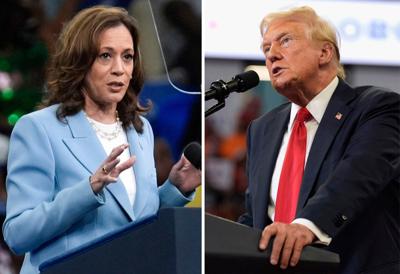Now that the two presidential nominating conventions are over, leaders and operatives in both parties will begin the real work of ginning up turnout in key states across the country — and even in nonbattleground states like Louisiana.
Local supporters of Vice President Kamala Harris and former President Donald Trump want to help their respective candidates get the largest possible national vote total, even though the votes that really count will be those cast by the antiquated Electoral College.
“The energy level among Democrats picked up dramatically after Joe Biden dropped out, replacing the atrophied optimism that had prevailed before then,” says pollster and Xavier University of Louisiana sociology professor Silas Lee, who has polled for the Biden/Harris team since 2020. “Kamala Harris has given Democrats’ energy level a shot of adrenaline. It has even elevated excitement and enthusiasm among independents.”
Lee attributes this to several factors, particularly a desire among voters everywhere for an alternative to a rematch between Trump and Biden.

Clancy DuBos
Even though Louisiana is “not in play” in the presidential contest, Lee says the Dems’ higher level of enthusiasm could “narrow the gap” in the Bayou State.
“Instead of Trump getting 58% or 59%, as he did the last two times, Democrats hope to keep him to 53% or 55%,” Lee said.
Of course, Republicans will be working just as hard to give Trump and other Republicans on the ballot in ruby-red Louisiana the highest possible margins.
Historically, presidential elections produce Louisiana’s highest voter turnouts. More than 70% of our state’s registered voters cast ballots in the 2020 presidential contest, and that had a huge impact on local and regional elections.
The turnout on Nov. 5 will likely be near as high — if not a tad higher — than it was in 2020, but the impact on local politics will vary greatly.
Four years ago, Republican U.S. Sen. Bill Cassidy faced 14 challengers on the same November ballot topped by Donald Trump, Joe Biden and 11 others. Cassidy garnered 59% of the vote in the Senate race, while Trump got 58% — and Louisiana’s 8 electoral votes — in the presidential showdown.
Cassidy was heavily favored, of course, but Trump’s candidacy guaranteed a high GOP turnout — and figured prominently in the easy reelections of the five Republican members of the House delegation.
This year, neither of Louisiana’s senators is up for reelection. Meanwhile, court-ordered redistricting has altered the landscape of House races in many parts of the state.
The biggest difference is the creation of a second majority-Black congressional district anchored by Baton Rouge — and the elimination of one safe GOP district. Election forecasters predict voters in redrawn House District 6 will elect a Democrat, which would reduce the state GOP’s 5-1 congressional advantage over Dems to 4-2.
While that’s only one seat among 435, it could help tip the balance in the House, where the GOP currently holds a razor-thin majority. Also at stake are the national profiles of House Speaker Mike Johnson of Benton and Majority Leader Steve Scalise of Metairie.
Locally, the hottest elections will be in Baton Rouge, with Lafayette sharing some of the action.
Baton Rouge has a red-hot mayor’s race, a number of contested races for the Metro Council, a wide-open race for the new majority-Black congressional seat and a three-way contest for the state Public Service Commission. High voter turnout will play a big role in those contests.
State Sen. Cleo Fields, a Democrat and the early favorite in the District 6 congressional race, is one of six candidates vying for the seat. All six are African American, but only one — former state Sen. Elbert Guillory of Opelousas — is a Republican. Fields previously served two terms in Congress, from 1993-97.
While the new congressional district is anchored in Baton Rouge, it reaches into Lafayette and Shreveport. Ditto for Public Service Commission District 2, which is also up for grabs after incumbent Commissioner Craig Greene chose not to seek reelection.
Four years ago, New Orleans had hotly contested races for district attorney and more than a dozen judgeships alongside the national showdown between Trump and Joe Biden. This year, New Orleans, Shreveport and Jefferson Parish have no contested parishwide elections.
In New Orleans, the only contested elections will be for a pair of district school board seats. Five of the board’s seven incumbents drew no opposition.
That kind of political calm stands in stark contrast to the contest atop the ballot. Even so, turnout all across the state will be high.




